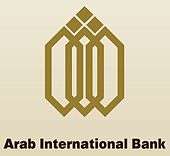Arab International Bank
 | |
| Founded | 1974[1] |
|---|---|
| Headquarters | Cairo, Egypt |
Key people |
Atef Mohammed Ebeid, Chairman & Managing Director |
| Products | Investments |
| Total assets | 4 Billion USD (December 2009)[2] |
| Website | www.aib.com.eg |
The Arab International Bank (AIB) (Arabic: المصرف العربي الدولي), founded by 'international treaty' [1] to 'enjoy certain privileges', is an investment bank headquartered in Cairo which operates outside the jurisdiction of the Central Bank of Egypt. Its chair is Atef Ebeid, appointed by Hosni Mubarak shortly after being removed from his position as prime minister.[3] It conducts business through a network of 7 branches in Cairo, Alexandria and Port Said.[1]
Privileges
By virtue of the Treaty, the Bank enjoys certain privileges in the territories of the Member States (shareholders). These include - as stated on their website:[1]
- Exemption from laws regulating banks, credit, exchange control, statutory auditing requirements, public institutions, public companies and joint stock companies.
- Immunity from all forms of nationalization and seizure of shares in and deposits with the Bank,
- Inviolability of the bank’s documents, records and files, and immunity from judicial, administrative and accounting control and inspection rules and laws,
- Confidentiality of customers’ accounts with the Bank which are not subject to judicial or administrative distraining orders.
- Exemption from tax of any kind on its funds, profits, dividends and all its activities and different transactions.
- Exemption from taxation and any obligations for the payment, withholding or collection of any tax or duty, which may be imposed on its customers.
Shareholders
The bank’s shareholders include the states of Egypt (~39%) and Libya (~39%) and the Abu Dhabi Investment Authority (~13%).[4]
Operations
The Bank states its activities as follows:[1] 'The Bank undertakes all banking, financial and commercial activities relating to economic development and foreign trade particularly in member states, Arab countries and other countries.'
It may not carry out transactions in Egyptian pounds, so it invests its liquidity with local and foreign banks. It also has a sizeable and marketable investment portfolio.[3] The financial year of the bank, was amended in September 2007 to end on 31 December, before that it had ended on 30 June.[1]
Criticism
Egyptian law does not allow the prevention of money transfers unless by court order, and the AIB is regarded as a haven for businesses and businessmen seeking secretive accounts or to safely transfer funds. It also deals with the major institutions and individuals within the state apparatus.[5]
2009
Former Members of Parliament Abu El-Ezz El-Herreiry and Gamal Zahran demanded that AIB close to end its corruption. "The bank is turning into a giant octopus that is going to swallow public money... the confidentiality the chairman imposes on bank clients, accounts and the volume of transfers makes the bank a doorway for all manner of crimes." El-Harreiry said in an article entitled "A request for terminating the Arab International Bank".[3]
2011
AIB's awkward situation was further highlighted at the outset of the 2011 Egyptian revolution; it is suspected that heavy outflows were transferred from this bank after 25 January 2011.[3] A senior AIB official said that it saw large amounts of money transferred out of the country before 25 January 2011, but denied that significant transfers had taken place during the week after banks reopened.[5]
Claiming he learned the bank was given orders to transfer large sums abroad, a lawyer has filed a lawsuit with the attorney general against it, calling for a freeze on transactions and a transfer of assets. He accuses Atef Ebeid of involvement in the transfer of funds of "corrupt businessmen and officials" abroad in "unknown and obscure" banking operations. He called for the opening of an investigation into "suspicious and dubious" decisions taken in the current circumstances.[3]
Ebeid's reaction to such claims was that "no ministers or big businessmen are depositing accounts in the AIB.... on the contrary, some 90% of its balance comes from small depositors." He also denied claims that AIB is used as a doorway to money laundering, and that "the desire for personal revenge is behind such allegations."[3]
See also
References
- 1 2 3 4 5 6 "AIB Establishment" Check
|url= - ↑ "Assets" Check
|url= - 1 2 3 4 5 6 "Egypt's Arab International Bank: questions asked". Retrieved 30 March 2011.
- 1 2 "Money transfers put Arab International Bank in the spotlight". Daily News Egypt. Retrieved 30 March 2011.